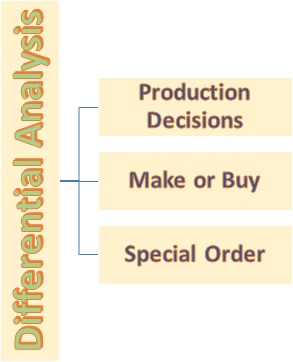Incremental or Differential Analysis
Incremental analysis also known as differential analysis is a type of performance evaluation where managers measure different options in order to make informed decisions. Incremental analysis allows managers to better understand the profitability of different types of options.Management uses differential analysis to determine if they could drop a given production line, start a new production line, borrow some cash for investment, invest in a given project, etc.
The underlying concept of incremental analysis is determining, analyzing and evaluating the associated relevant costs. Usually the project with less cost is considered favorable while the project with a higher cost is considered unfavorable.
When managers use incremental analysis, they are more concerned on relevant costs pertaining to the situation they have at hand.
Examples of relevant costs include opportunity costs, out-of-pocket costs and future cash flow. Costs that are less relevant are not included nor considered in incremental analysis. Some of the examples of non-relevant costs include sunk costs, general overheads and depreciation.
For the purpose of understanding how differential/incremental analysis is used, we could look at three main areas where it is being used:

